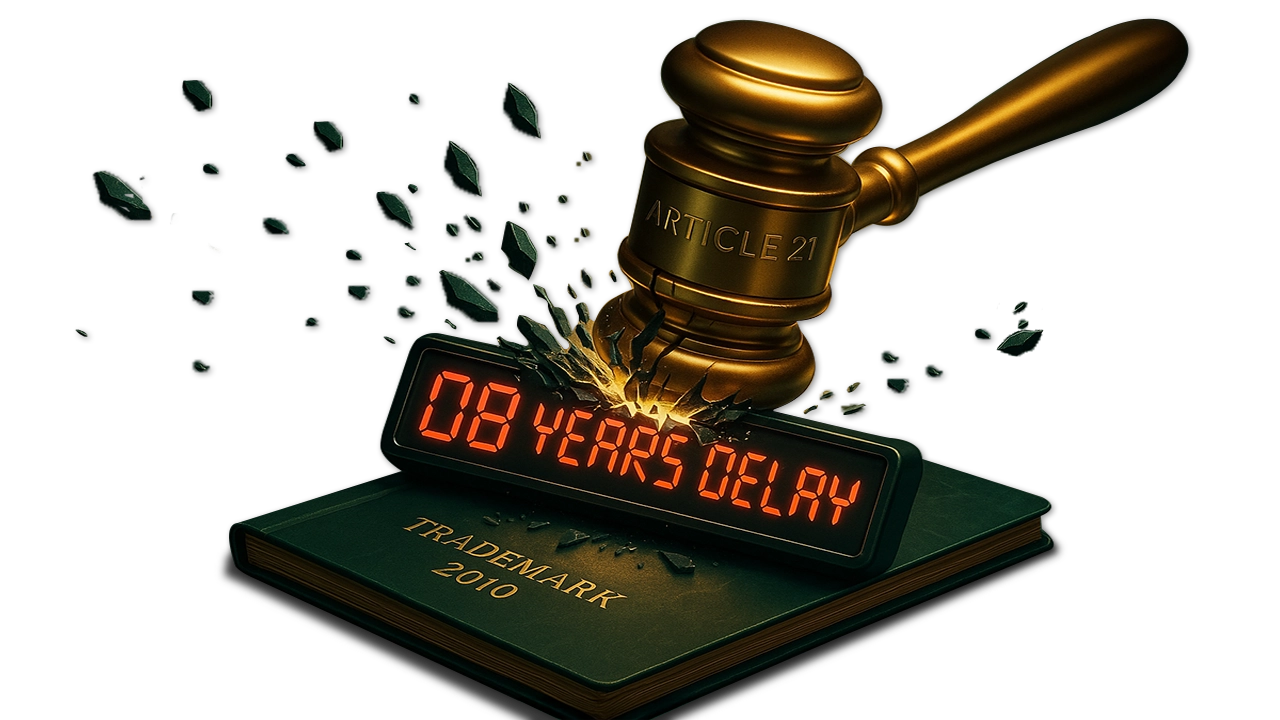The convergence of constitutional and intellectual property law is an infrequent yet intriguing legal development. One might not ordinarily associate the right to “life” under Article 21 of the Constitution with the procedural timelines of trademark adjudication. Yet, in a recent and notable judgment, the Rajasthan High Court in Nirmala Kabra v. Registrar of Trademarks and Anr1 has extended the ambit of Article 21 to encompass the right to speedy and expeditious disposal of trademark applications. This judicial interpretation adds an unexpected but significant dimension to the evolving jurisprudence surrounding fundamental rights in India.
In a striking development at the intersection of intellectual property law and constitutional law, the Rajasthan High Court recently delivered a judgment that has prompted both commendation and critique. In Nirmala Kabra (supra) case, the Court addressed the issue of extraordinary delay in the disposal of a trademark registration application and, in doing so, held that the right to a speedy and expeditious disposal of such applications is an integral component of the fundamental right to life under Article 21 of the Constitution of India.
The facts are, on the face of it, compelling that the petitioner had filed a trademark application for the mark ‘Breastone’ in June 2010. An opposition was filed in 2013. By 2017, pleadings were complete, and the matter was listed for evidence. Since then, however, no progress has been made. For over eight years, the Registrar of Trademarks failed to act, leaving the application in limbo. Aggrieved by this inaction, the petitioner approached the High Court seeking a direction for the application to be adjudicated.
The Court’s response was stern and uncompromising. It took serious note of the Registrar’s failure to comply with the procedural safeguards embedded in the Trademark Rules, 2017—particularly Rule 50, which governs the hearing and decision-making process and allows for only two adjournments per party.
Terming the delay as “shocking and surprising,” the Court held that the Registrar’s failure to act amounted to a clear violation of both the Trademark Rules and the principles of natural justice. Such prolonged administrative inertia, the Court observed, not only defeats the purpose of trademark registration but also results in potential loss of evidence, unnecessary costs, and a growing sense of injustice for the parties involved, thereby running contrary to the principles of natural justice. This leads to an interesting question: Whether the principles of natural justice applicable to matters concerning intellectual property?
Natural justice in Intellectual property rights
Natural justice is an inseparable ingredient of procedural fairness and reasonableness. The Supreme Court of India has consistently held that quasi-judicial and even administrative authorities must adhere to the doctrine of procedural fairness, as encapsulated in the classical principles of natural justice, particularly when their actions or decisions adversely affect any individual. At the Indian Trade Marks Office (TMO), the Registrars and other officers are entrusted with various quasi-judicial responsibilities, including the hearing, examination, and determination of trademark applications under the Trade Marks Act, 1999 and the Trade Marks Rules, 2017. Accordingly, the obligation to uphold the principles of natural justice equally extends to the proceedings and orders of the TMO, given its quasi-judicial character.
The Court shedding light on these principles not only ordered the petitioner’s application to be decided within three months but also issued a general directive to the Registrar to expedite all pending applications. In strong terms, it emphasized the systemic consequences of delay: loss of evidence, unnecessary litigation costs, erosion of public trust, and, most significantly, the violation of natural justice. Yet, it was the Court’s invocation of Article 21 that has sparked intellectual debate. While it has raised acceptance from certain quarters at the same time it has garnered raised eyebrows. Let’s look into why the application of Article 21 is a moot point.
The Doctrinal Debate: A Critique of Rights Inflation
The judgment states: “The right of speedy and expeditious disposal of these applications is one of the most valuable and cherished rights of the applicant guaranteed under Article 21 of the Constitution of India. It is an integral and essential part of the fundamental right to life and enshrined under Article 21.”
Critics argue that the judgment falls into the trap of rights inflation, an increasingly common phenomenon where routine administrative failures are framed as violations of fundamental rights. They state that from a doctrinal standpoint, the move seems problematic as filing a trademark application does not confer a proprietary right; it merely initiates a process through which rights may eventually accrue. The argument that delays in processing such applications amount to a deprivation of property under Article 300A is also tenuous, as there is no vested right until registration is granted. The Indian Constitution takes a more restrained view of property, especially after the 44th Amendment downgraded the right to property from a fundamental to a constitutional right under Article 300A. Moreover, even if one accepts that excessive delays breach the principles of natural justice, such violations do not automatically rise to the level of constitutional infractions under Article 21 without a demonstrable impact on “life” or “personal liberty”.
In this context, it’s worth noting the differing yet complementary approaches taken by international judicial bodies. For instance, the European Court of Human Rights (ECHR) has directly addressed procedural delays in IPR matters as violations of the right to a “fair trial within a reasonable time” under Article 6 of the European Convention on Human Rights. In cases like Denev v. Sweden2, the ECHR found that undue delay in registration procedures for intellectual property can violate human rights, given that such rights are now viewed within a human rights framework in Europe. Additionally, the ECtHR ties IPR to the “right to property” as protected by Protocol 1, Article 1 of the European Convention.
Further, in the USA, intellectual property rights derive from Article 1, Section 8, Clause 8 of the Constitution which is meant to “promote the Progress of Science and useful Arts.” While there is no explicit fundamental right to timely registration, procedural fairness and due process regarding IPR have constitutional underpinnings, and prolonged delays could be challenged as violations of due process or takings, depending on the context.
Moreover, while the UK law does not constitutionally guarantee speedy IPR decisions, administrative law and the common law’s emphasis on fair procedure and proportionality have led courts to consider unexplained delays as a breach of natural justice, which can be challenged through judicial review.
Conclusion
Comparatively, all three jurisdictions (Europe, USA, UK) recognise procedural fairness and timely adjudication as integral to justice in intellectual property matters. In India, the expansion of Article 21 to cover IPR registration delays is broadly consistent with global trends that embed IPR within broader human rights and fair process paradigms. This linkage demonstrates that prolonged delays in IPR registration can indeed raise constitutional or human rights concerns, positioning India within evolving international practice on this issue.
The Nirmala Kabra judgment, therefore, stands as a complex and polarising decision. While it’s a commendable judicial effort to tackle a tangible administrative problem, its reliance on Article 21 raises significant doctrinal questions. The judgment correctly identifies the systemic failures and their impact on applicants, but the choice to elevate a procedural delay into a fundamental rights violation may be seen as an overreach, pushing the boundaries of constitutional law into the domain of administrative efficiency. This legal maneuver, while effective in forcing the hand of the bureaucracy, risks diluting the sanctity of fundamental rights by applying them to routine administrative matters. The core issue of bureaucratic inertia remains, and while the judgment provides a powerful, albeit controversial, solution in this specific case, it leaves a larger question unanswered: is a constitutional hammer truly the most sustainable tool to fix an administrative nail? The long-term efficacy of this approach remains to be seen, but it undoubtedly marks a new and provocative chapter in the intersection of Indian constitutional law and intellectual property rights
Citations
- Nirmala Kabra v. Registrar of Trademarks and Anr 2025 SCC OnlineRaj 4072
- Denev v. Sweden, App. No. 25419/94 (Eur. Comm’n on H.R. Jan. 14, 1998)
Expositor(s): Adv. Mahelaka Abrar






